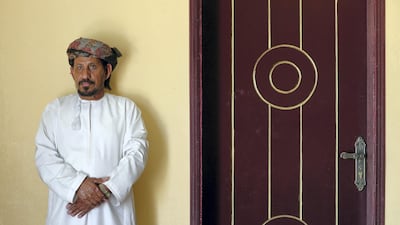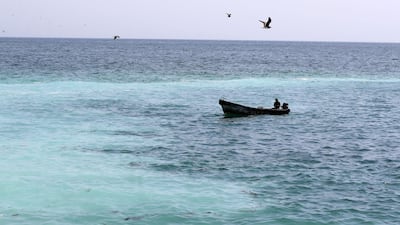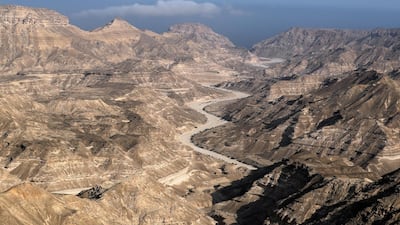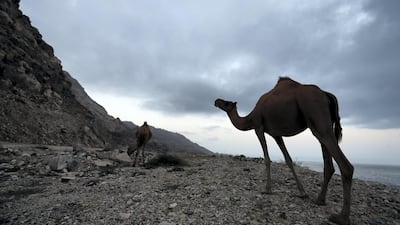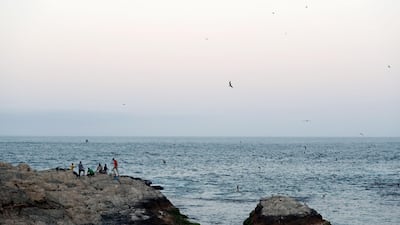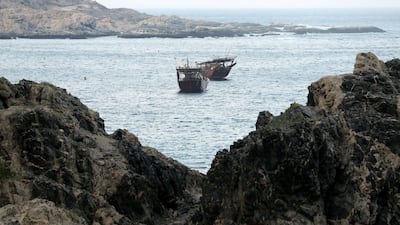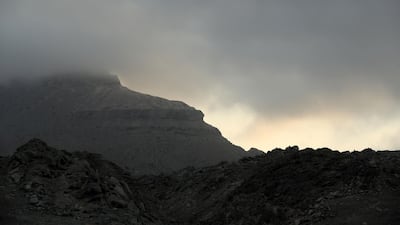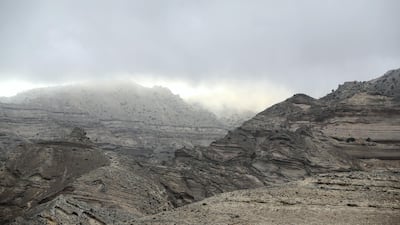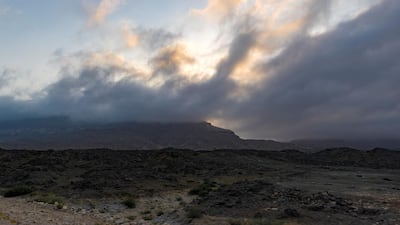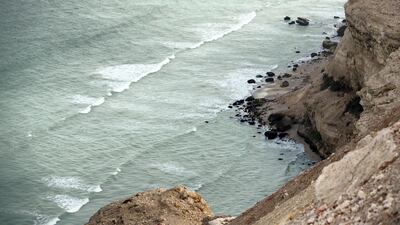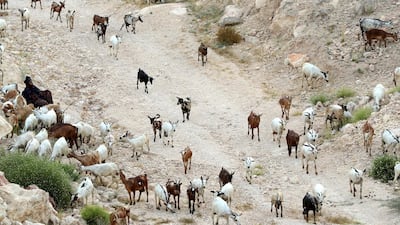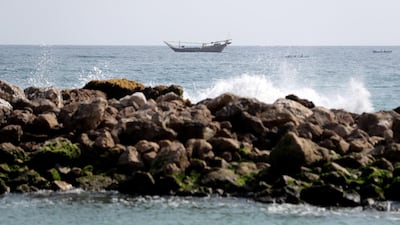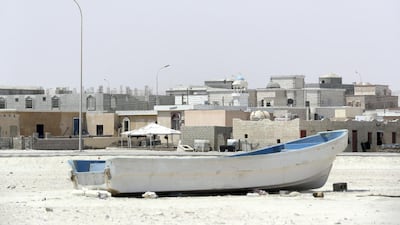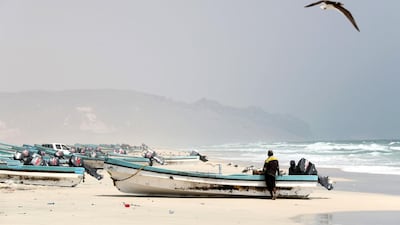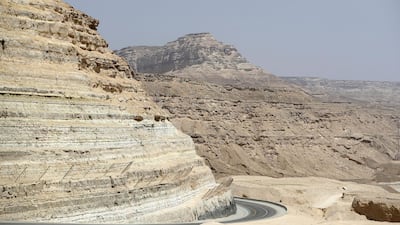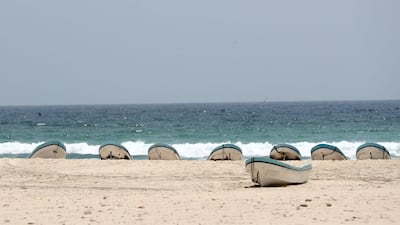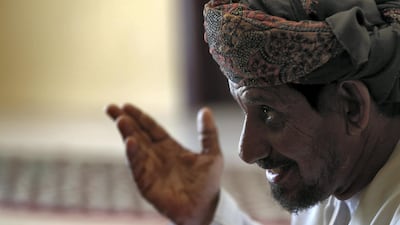Read more: The man who greened the UAE's desert
Khalifa Hamoud and Fabio Gasparini are an unlikely pair. They met in St Andrews, Scotland, in the kitchen of Miranda Morris, an anthropologist and one of the world’s foremost experts in southern Arabian languages.
Mr Hamoud, a fishermen from a remote seaside village in southern Oman, was bundled in layers and a thick woolly jumper. He had come to Scotland to help Morris translate a corpus of Omani languages.
Mr Gasparini, a young Italian linguist with spectacles and bushy black beard, had written to Ms Morris a few weeks earlier when he came across her notes on Bathari, a language on the brink of extinction.
She extended an invitation: one of the world’s last Bathari speakers was due to visit her. Why didn’t he come too?
Mr Gasparini flew from Turin and stayed three days, chatting to Mr Hamoud in Jordanian Arabic peppered with Hebrew.
The pair found themselves joined by a love for a language with fewer than 20 fluent speakers. Mr Gasparini would devote the next three years to its study for his doctorate at the University of Naples.
He now hopes his research, the only published on the language apart from work by Ms Morris in 1983 and 2017, will garner interest in a near-vanished language.
Almost a year after their kitchen meeting in late 2015, Mr Gasparini found himself in the passenger seat of Mr Hamoud’s rusting pickup, listening to a warbled cassette of poetry as they belted down a new coastal road to a remote corner of the Arabian Peninsula.
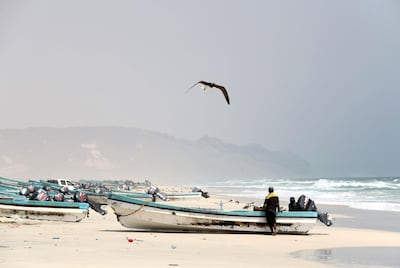
House of dust
The Bathari lived on the edge.
Centuries of tribal expansion had stripped their territory to a parched piece of coast in south-east Oman, between the sharp cliffs of a plateau and the Indian Ocean. Most settlements could only be reached by boat.
Even in the 1980s, the Bathari swam kilometres out to sea on inflated goat skins to set shark traps. Fins were exported. Rice, dates, butter and flour were rare luxuries.
Vegetation and water were so scarce that some called the tribe Bait Al Bath, the house of dust. Its language was one of maritime survival.
Bathari is one of six Modern South Arabian languages, common in southern Oman and Yemen before Arabic became the language of the state.
Bathari ebbed when modern housing, schools, roads and infrastructure arrived in the 1970s and 1980s.
Arabic became a gateway to employment and opportunity.
“Everybody would think Arabic was more important for the new Oman and the new life, so why keep speaking the local languages?” said Mr Gasparini. “So parents just stopped talking to their kids in Bathari.”
While some southern Arabian languages have proved robust, Bathari is almost gone. There are only 12 to 17 elderly fluent speakers left, as well as a few dozen middle-aged speakers who mixed it with Arabic.
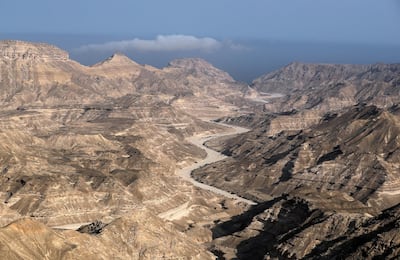
Mr Hamoud dropped Mr Gasparini off in Shalim, a hamlet made up of mostly South Asian oil field workers who spoke pidgin Arabic and no English. Mr Gasparini stayed at the local rest house for a month without a vehicle, waiting for days when Mr Hamoud had time to introduce him to others.
Undeterred, he later rented an apartment in Shuwaymiyah, a fishing village of sheltered white beaches and the unofficial capital of the Bathari tribe.
This time, Mr Gasparini made headway. People welcomed interviews that evoked nostalgia.
Scholars had previously paid Bathari little attention, assuming it was just a dialect of Mehri, the more dominant language of another tribe. Mr Gasparini’s research raised the question, was Bathari a language in its own right?
“It’s very tricky to say it’s a language of its own or a dialect, because these are very western concepts,” said Mr Gasparini.
“If you think about it from a social-linguistic point of view, you can say that Bathari is quite a language on its own, mainly because of the history of the tribe.”
Bathari speakers were always polyglots who understood other tribal languages. The understanding didn’t run both ways, likely because the Bathari are a small, isolated group.
It is the throatiest of South Arabian languages and retained more Arabic phonetics and loan words than Mehri.
Mr Gasparini focused on structure, syntax and emphatics but the vocabulary he did record told of the sea’s bounty and hardships.
For instance, he documented about 30 names for the wind, each with its own association with fishing conditions, like bilot, a strong cold winter wind from the inland, or medit, a gentle wind signifying calm water and plenty of fish.
“It was a matter of survival,” said Mr Gasparini. “They needed to know what they could do at exactly what time.”
His guide in Shuwaymiyah was Mr Hamoud, Bathari’s unofficial guardian.
Ms Morris had worked with Mr Hamoud’s relatives in the mid-eighties when he was a boy. She returned in 2013 to see if any Bathari speakers remained.
Mr Hamoud recognised her and collected recordings on her behalf. Later, he would round up interviewees for Mr Gasparini.
His own Bathari is laced with Arabic, typical for people his age. Like most Bathari men, Mr Hamoud also speaks Mehri and Shehri. He considers the languages “completely different”.
“Every tribe has its language,” said Mr Hamoud and he launched into recitations of melodic poetry about Bathari heroes at sea and on land.
“I know it but my children don’t speak it,” he said. “Now they’re all at university. They will take government jobs, and these jobs will be in Arabic.”
“Really, I’m sad about it. I wish people spoke it.”
My darling is half a camel’s hump
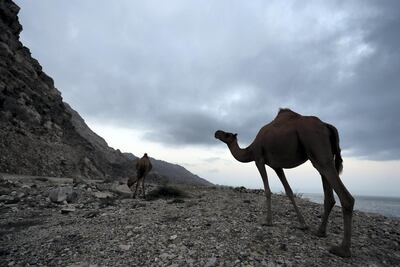
Mr Gasparini's work added to the poetry Morris recorded between 1976 and 1980, printed in her work, Some Preliminary Remarks on a Collection of Poems and Songs of the Batahirah.
She documented poetry of isolation "I am in the midst of hardship and sharks while you are painting your face", poetry in praise of loved ones, like a daughter "My darling is the fat of the kidneys / My darling is half a camel's hump", and domestic animals, like a beloved goat, "Mating I refuse for her, even to one who offers a hundred", or even a familiar sea turtle: "She has been eating of the best seaweed and has had no shortage of food".
Poems of satire, recited to pleas of laughter, always named the brunt of the joke.
"He opens and shuts his mouth like a moral eel
and his whiskers bristle like a desert lynx
What an eyebrow and what bags under the eyes!
What an eyebrow and what a forelock!
I saw him bob up and down in the water like a coconut"
Bathari poetry, observed Morris, was a shorthand for life. But by the late 1970s, men already preferred to compose in Arabic with themes foreign to local tradition.
Bedouinisation
The prestige of Arabic has only grown. In southern Oman, as in much of the Peninsula, bedu ancestry and desert heritage are associated with power. Bedu culture, and the Arabic language, are often mistakenly considered the original identity of the Peninsula.
Youth downplay heritage that is not bedu and the diversity of culture is lost, said Mr Gasparini. “I’m really intrigued by the shift in the identity in newer generations because almost every young man presents himself as a bedu. Bathari is looked down upon. They were very poor. People were ashamed of speaking Bathari.”
Further study is critical to understanding human and natural history, said Prof Janet Watson, a specialist in Modern South Arabian languages from the University of Leeds who visited Shuwaymiyah with Morris in 2013.
“The [south Arabian] languages are very close to nature and once you’ve got urbanisation, they’re not longer in the context of nature,” said Prof Watson. “What’s happening is, they’re using Arabic to talk about modernity. There were no telephones, no televisions, no roads, no cars.
“That language is showing all sorts of signs of what happens to a language when it’s on the way out.”
Following his PhD in 2018, Mr Gasparini curated an archive of Bathari with the Laboratory of Experimental Phonetics at the University of Turin. He hopes to do more on Bathari before it vanishes.
"It will be here"
On Fridays, the young women of Shuwaymiyah meet under the shade of a seaside boulder, a discreet lookout with a view of the fishing harbour, where they share milk tea and biscuits.
Bathari slips into the conversation and when it does, it is understood. Most conversation is in Arabic.
The night before, Bathari dominated fireside chatter.
“The elders were there, so we spoke it,” said Lukhiyar, one of the young women.
Will future generations speak Bathari?
“Absolutely,” said her friend Nasra.
“Of course not,” said Lukhiyar. “It’s gone.”
Nasra turned to her. “It will be here. We will teach our children and they will teach their children. It will be here.”
